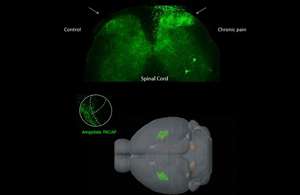New study finds connection between chronic pain and anxiety disorders

New research provides insight into a long-observed, but little-understood connection between chronic pain and anxiety and offers a potential target for treatment. The study's findings, published as an Article in Press in Biological Psychiatry, show that increased expression of PACAP - a peptide neurotransmitter the body releases in response to stress - is also increased in response to neuropathic pain and contributes to these symptoms.
The researchers examined the expression of PACAP (pituitary adenylate cyclase activating polypeptide) along one of the nervous system's pathways to the brain - the spino-parabrachiomygdaloid tract - which travels from the spinal cord to the amygdala, the brain's home base for emotional behavior.
Using models for chronic pain and anxiety, as well as models that can trace PACAP neurocircuits, the team members were able to observe where the stress and chronic pain pathways intersected.
"Chronic pain and anxiety-related disorders frequently go hand-in-hand," says senior author Victor May, Ph.D., professor of neurological sciences at the University of Vermont (UVM). In a 2011 study, he and members of the research team found that PACAP was highly expressed in women exhibiting PTSD symptoms.
While May and his colleagues saw an increase in anxiety-related behaviors in models of chronic pain, the anxious behavior and pain hypersensitivity were significantly reduced when a PACAP receptor antagonist - designed to block the response - was applied.
"By targeting this regulator and pathway, we have opportunities to block both chronic pain and anxiety disorders," says May, whose next step is to work with University of Vermont chemistry colleagues to develop small molecule compounds that can antagonize PACAP actions.
"This would be a completely different approach to using benzodiazepine and opioids - it's another tool in the arsenal to battle chronic pain and stress-related behavioral disorders."
More information: Biological Psychiatry, www.biologicalpsychiatryjourna … -3223(16)32725-1/pdf















